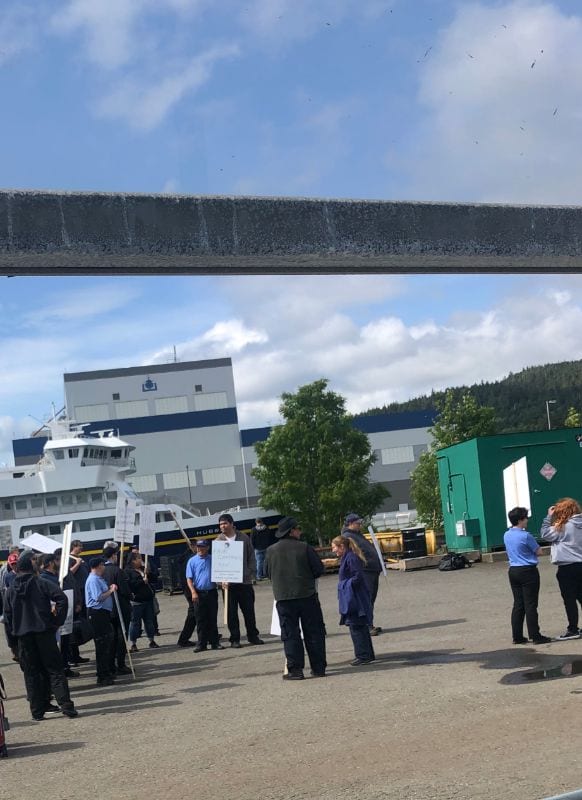
For passengers aboard the Alaska Marine Highway System ferry Columbia, their arrival at Ketchikan about noon on July 24 offered what they figured would be a quick stop, with time for lunch on shore and a bit of shopping.
“We got off and came back at 3 p.m., and there were picket lines,” said Sharon Dickson, of Phoenix, Ariz. “They said they were sorry, but they hadn’t had a contract in two years and nine months.”
Those still on board the Columbia learned over the ferry’s public address system that the Inlandboatmen’s Union of the Pacific had gone on strike and that the ferry would not leave Ketchikan. Passengers were advised that they could spend one more night on the ferry, but after that would have to get themselves and all their vehicles off and figure would their own way out of Ketchikan. Passengers on other AMHS ferries were similarly stranded as ferry service ground to a halt.
They were advised that they would receive a full refund of their ferry fares, and also invited to come to the ferry’s snack bar and help themselves to all the food there, including sandwiches, pies and more, Dickson said.
For Dickson and her husband, Rick, owners of a construction company in Phoenix, it meant getting their 29-foot recreational vehicle off of the Columbia, finding a place to park it for the night, and figuring out how to get them and their RV to Seattle.
They ended up parking overnight in the local WalMart parking lot. They were also able to arrange transport of the RV onto a barge owned by Alaska Marine Lines, at a cost of over $2,000. Then they had to purchase one-way plane tickets to Seattle and hotel accommodations there, as they waited for their RV, which arrived on July 29.
The Dicksons, who were on a three-month vacation, took the whole experience in stride. “I’m sure both sides have a story and I’m sure they (the union) felt they had to do it,”
Sharon Dickson said. “The striking union people were very polite. The first guy I talked to said he was really sorry, but the union voted to do this,” she said.
Ernie Vanderwalt, an executive recruiter from Charlotte, N.C. who was vacationing with his wife Alice, was less sympathetic. “I think there is a noble way of doing this and then there is the way they did it, using the passengers as peons,” he said. “The honorable way would have been to say they were going to strike from midnight July 29,” he said.
When passengers had to leave the ferry in the pouring rain they were offered garbage bags to cover themselves and their luggage, he said. Vanderwalt said he called the AMHS office and that cabs were finally sent to help transport some of the passengers. “It left a certain taste in the mouth,” he said. “These union people left to go home. They seemed like they couldn’t give two hoots about it.”
The Vanderwalts, who were traveling without a vehicle, were able to book a flight to Seattle, and were back home in North Carolina a day after they left Ketchikan, but not without considerable disappointment. “The reason I came to Alaska was to go on the Inside Passage, so it was highly disappointing to end our trip like that in Ketchikan,” he said.
The additional expense of having to book air passage from Ketchikan aside, both couples seemed more concerned about the plight of other ferry passengers than themselves.
“Some of the people put off of the ship were in their 80s,” Vanderwalt said. “A lot of people who don’t have the means were left in a lurch,” he said. “A lot of people had to stay the weekend, because they couldn’t get their vehicles on the barge. There were people with health issues, people with dogs. When you leave them all like that you put them at risk,” he said. “One woman slept in her car with her dog.”
“One woman had three children and had recently lost her husband,” said Dickson. “They spent the night in their car.” Dickson said the woman told her a local hotel had doubled their price when they heard about the strike.
“There was one guy who had to get to the Coast Guard and people going to jobs. We were inconvenienced, but we weren’t in jeopardy of losing our jobs,” she said.
Her husband, his father and the Dicksons’ son had traveled to Alaska about a decade ago, Dickson said, but for her, and the Valderwalts as well, it was their first trip to the 49th state.
Both couples agreed that up until their adventure ended abruptly in Ketchikan, they had had a wonderful time, including the trip on the Columbia itself, and might come back to Alaska again.
The Vanderwalts had flown into Anchorage and taken a trip to Denali National Park before heading to Juneau, where they boarded the Columbia. “We got on at Juneau, off at Petersburg, off at Ketchikan,” Vanderwalt said. “We were headed to Bellingham, but unfortunately we didn’t make it that far.”
The Dicksons, after being reunited with their RV in Seattle, were continuing on to British Columbia before heading back to Arizona. “I would go back again, but might be a little leery to take the ferry,” she said.





